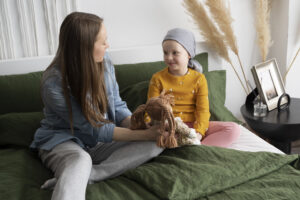
Adapting to the diagnosis and the first stages of treatment
What should you do when you first hear about a child with cancer?

Childhood oncology is a great challenge for a family, which causes various emotions: shock, distrust, relief from finding out the cause of the disease. These feelings are natural and can be managed. Parents need time to accept the disease, find support among loved ones and professionals.
Psychological assistance helps to maintain balance and cope with emotions. It is important to take care of basic needs: sleep, food, communication with loved ones. You shouldn't punish yourself for fear or anxiety - treating yourself with care strengthens your internal resources.
It is also useful to try to look at your fear as an object, to study it, to track what increases or decreases it.
Remember: The child is not alone, doctors are there, and fear can be controlled. Every step in this direction is an important achievement for which you should praise yourself.
How to overcome the feeling of guilt?

Guilt is one of the most common emotions experienced by parents when they learn about their child's cancer diagnosis. In such circumstances, guilt often becomes irrational, but at the same time very strong. Especially when someone hints that the disease may be the result of a certain lifestyle, upbringing, or even past "mistakes." Remember: such accusations have no scientific basis and arise as an attempt to find at least some explanation for what happened.
That's why psychological support is critical. Experts recommend identifying irrational beliefs at an early stage and working to transform them. Support can be provided both individually and in a group format - the main thing is that parents have the space to talk honestly about their experiences.
What can help?
- Recognize.that guilt is a normal reaction to abnormal circumstances.
- Talk. talk about your emotions with a psychologist or in a support group.
- Remember.We want to emphasize that cancer is not the result of your thoughts, words or actions.
- Focus on the fact that you are already doing the best you can with the resources and knowledge you have.
This is a difficult time. But with support, open communication, and care for yourself and other family members, you can get through this journey with dignity, love, and hope.
How can a family prepare for long-term treatment?

When a family is facing a long period of treatment, it is very important to create an environment of safety, trust and predictability for the child. Here are key tips to help you go through this journey together.
- Trust in doctors and cooperation
Treatment is a team effort. Explain to your child that he or she is the main member of this team. Communicate openly with the medical staff, share your observations about the child's well-being. This helps make treatment more effective.
- Maintaining a daily routine
The mode stabilizes and gives a sense of security. It is advisable to wake up and go to bed at the same time. After waking up, hygiene and changing clothes. We recommend dividing the day into study, rest, food, and leisure.
- Learning during treatment
It is important to maintain the learning process - it maintains normalcy, helps develop memory and thinking, especially after anesthesia or chemotherapy.
- Socializing and walking
Even short trips out of the ward are a breath of freedom and important socialization. If possible, go for a walk outside and socialize with other children.
- Quality leisure time
Create something that brings joy in the hospital: books, cartoons, board games, creative kits, and for teenagers, safe use of social networks.
- Taking care of yourself is taking care of your child
Remember: to support your child, you must first take care of yourself. Eat, sleep, drink water, and ask for help when you need it.
- Information hygiene
Do not read forums without restrictions - the information there is general and often incorrect. Trust the medical team that knows the specifics of your case.
- A positive attitude is a medicine
Look for pleasant moments: news from home, favorite entertainment, jokes, rituals. Positive thoughts help you find strength without denying the problem.
- Psychological support
A psychologist is not just for crisis moments, but a daily support. Talking to a specialist reduces anxiety, helps to cope with fear and pain, and opens the way to inner balance.
- Support group
Delegate care to your loved ones: someone will help with household chores, someone will replace you for a walk or give you the opportunity to relax. This is not weakness, but wisdom. - Hospital is not a punishment
Explain to your child: "We are here not because of a mistake, but because we have everything to help. We will return home as soon as we can." This gives confidence to both the child and you.
Hair loss. How to help your child adapt?

Hair loss is a common side effect of treatment, but it is important to explain to your child that this is temporary and that the hair will grow back after the therapy is completed.
Tips for support:
- Haircut: Offer your child a new haircut to make them feel more comfortable with their new look.
- Hat, scarf or wig: These can be good options for maintaining convenience and comfort.
- Emotional support: Support your child with words such as: "You are beautiful in any way you look," to lift your child's spirits and reduce the stress of change.
Our partners
